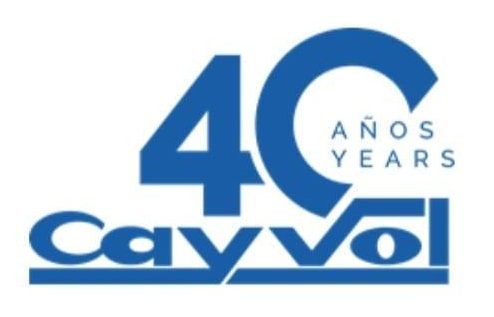History
of Cayvol
since 1982
Our history
FOUNDED IN 1982, CAYVOL IS DEDICATED TO THE MANUFACTURE AND ASSEMBLY OF INDUSTRIAL VEHICLES WITH THE FOLLOWING EQUIPMENT: BOX-CARRIERS, VEHICLE-CARRIERS (RESCATUR), CONTAINER-CARRIERS (Multivol and Multicontainer), SELECTIVE COLLECTION (RECUPRES), SPECIFIC BODYWORK AND TIPPER LORRIES.
The clear vocation for the future and constant reinvestment of the benefits obtained have converted our small workshop in the centre of Barcelona from which we initiated our walk into the leading company that Cayvol is now. This allows us a great range of products of a high quality and recognized benefits, as well as the fact our factories and assembly workshops churn out more than one thousand vehicles a year.
In the latest years, we have made a clear move in the Environmental sector that has led us to create a Department of Investigation and Development (I+D) that works to achieve new and better equipment and services, because of this, we have now decided to obtain a few Overweight Permits for our fleet. The desire to open new doors in the international market has also urged us to work in this new line, so that nowadays we have an important presence in a number of countries of South America, Europe, Africa and Asia.
However, without a doubt, what we are most keen in obtaining is the satisfaction of our demanding clientele, to whom we want to offer the adequate equipment to satisfy their needs, as well as obtaining the recognition of our partners for our continuous commercial and technical support.
1982
CAYVOL is created as a Catalan Cooperative Society (Sociedad Cooperativa Catalana) in 1982 with an initial incorporation of 13 members, all of them experts in manufacture of all types of tipping bodywork.
They started work in a small workshop in the centre of Barcelona, amplifying them in September that year with another workshop in the neighbourhood of Monistrol de Monstserrat.
1983
In 1983 the Barcelona factory was moved to the neighbourhood of Lliçà de Vall in the suburbs of the Catalan capital, commencing the marketing of its crane-carrying lorries.
1985
In 1985 CAYVOL COMERCIAL S.L. is created, dedicated principally, at the start, to marketing semi-trailers, absorbing a workshop dedicated to the manufacture of vehicle bodywork located in Montcada.
The Lliçà de Vall factory moves to these premises, taking an important step in its future to amplify the production capacity and to incorporate a new Commercial Director with a lot of experience in the sector.
1986
In 1986 the company continued to grow, incorporating into the structure another company from the sector dedicated to the construction of vehicle bodywork.
1988
In 1988 a new company, HIDRAULICA NAVAS SL was created, with the end of filling the cylinders needed for the manufacture of our equipment.
1990
In 1990 the Sant Fruitós factory was inaugurated, to which all the production of Monistrol de Montserrat is moved and the manufacture of the smaller series of equipment is commenced. Named Multicontainer, Multivol and Rescatur, they could now installed on the respective lorries.
The Sallent bodywork company moves to the Monistrol de Montserrat site and joins our group as CAYVOL MONISTROL SL.
1995
In 1995 another company operating within the sector located in La Llagosta is taken over, with the majority of the production of tipper lorries and special equipment being transferred to this new site, as well as commercial services and administration.
1996 until now
In these last few years there were takeovers of workshops in the Spanish capital Madrid (SET SL) and Zaragoza (HIDELCA SL) to give a more complete and accessible service to the clientele.
The 2008 global financial crisis that greatly affected the national Spanish market with a 80% fall in the sale of vehicles dedicated to construction. This forced the company to adjust accordingly, reducing significantly the workforce to the current 65 staff as the market showed signs of recovery.
Nowadays
Right now the CANYOL COMERCIAL SL company is the result of the fusion carried out by the different firms caused by the financial crisis. This led its current structure with two factories in Sant Fruitós de Bages and another in La Llagosta providing all the equipment.
